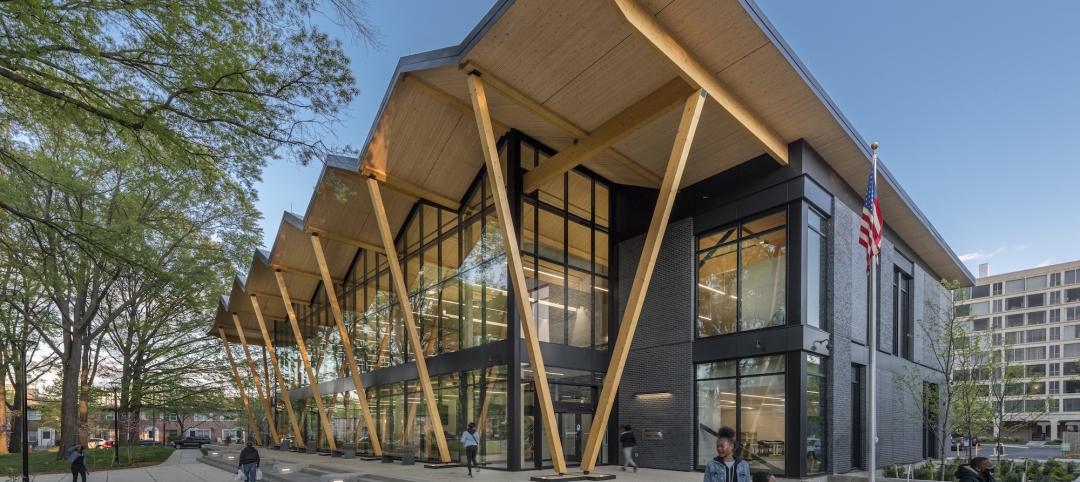The National Council of Architectural Registration Boards (NCARB) has launched the second phase of its revised certification path for architects without a degree from an accredited program. This newest path comes as part of a multi-year effort to streamline NCARB programs and initiatives to be more inclusive of individuals outside of the traditional path to licensure, while maintaining the rigor necessary to protect the public’s health, safety, and welfare.
Through the new NCARB Certificate Portfolio, architects licensed in a U.S. jurisdiction who hold any education other than an architecture-related degree—including those who do not have a college degree—can satisfy the Certificate’s education requirement by completing an online portfolio documenting learning through experience. The first phase, which launched in February 2017, enables architects with a four-year, architecture-related degree to satisfy the same requirement by documenting two times the Architectural Experience Program’s™ (AXP™) hours.
“Professional mobility is a goal of many practicing architects,” said NCARB President Kristine A. Harding, NCARB, AIA. “This revised path makes that goal achievable for a broader range of licensed individuals, while maintaining the quality standards expected by our boards and the public.” Together, these alternative paths form the successor to the Broadly Experienced Architect (BEA) Program, which was retired in 2016.
The NCARB Certificate is a valuable credential for architects that facilitates reciprocal licensure across the 54 U.S. jurisdictions and several countries, among other benefits. To qualify for certification, applicants must meet the NCARB Education Standard, traditionally done by earning a professional degree in architecture from a program accredited by the National Architectural Accrediting Board (NAAB).
Both the NCARB Certificate Portfolio and two times AXP option are offered at no additional charge to active NCARB Record holders and eliminates the BEA’s $5,000 review fee. It also facilitates a shorter, more objective review process than the previous program, allowing applicants to link exhibits in the portfolio to specific areas outlined in the NCARB Education Standard. Applicants will also need to meet NCARB’s experience and examination requirements to earn an NCARB Certificate.
U.S. architects interested in pursuing certification through the portfolio must have at least three years of continuous licensure in any U.S. jurisdiction without disciplinary action, and fall into one of two categories:
-
Architects with post-secondary education who have obtained 64 or more semester credit hours. These applicants are required to obtain an EESA evaluation and submit a portfolio to address any deficiencies.
-
Architects with less than 64 semester credit hours of post-secondary education. These applicants are not required to obtain an EESA and must address all education requirements through a portfolio.
Related Stories
Codes and Standards | Feb 1, 2023
New Jersey to allow private firms to conduct construction inspections
New Jersey recently passed a law that will allow towns to supplement construction code enforcement with help from the private sector. The legislation, which received bipartisan support, also allows municipalities to enter into shared service agreements with neighboring towns for construction inspections.
Sports and Recreational Facilities | Feb 1, 2023
University of Houston opens 'game changer' wellness center at downtown campus
The University of Houston-Downtown (UHD) recently opened its new Wellness & Success Center (WSC). The $39 million, 75,000 sf facility greatly improves the quality of the school’s exercise programs and areas dedicated to them. It also establishes a dynamic core and recognizable landmark for fostering and nurturing an on-campus community, according to a news release from SmithGroup, which designed the building along with HarrisonKornberg Architects.
Giants 400 | Feb 1, 2023
2022 Cultural Facilities Giants: Top architecture, engineering, and construction firms in the U.S. cultural facilities sector
Populous, DLR Group, KPFF, Arup, and Turner Construction head BD+C's rankings of the nation's largest cultural facilities sector architecture, engineering, and construction firms, as reported in the 2022 Giants 400 Report. Building types include museums, public libraries, performing arts centers, and concert venues.
Giants 400 | Jan 31, 2023
2022 Retail Giants: Top architecture, engineering, and construction firms in the U.S. retail building sector
Gensler, CallisonRTKL, Kimley-Horn, Henderson Engineers, Whiting-Turner Contracting, and Turner Construction top BD+C's rankings of the nation's largest retail sector architecture, engineering, and construction firms, as reported in the 2022 Giants 400 Report.
Giants 400 | Jan 31, 2023
2022 Government Sector Giants: Top architecture, engineering, and construction firms in the U.S. government buildings sector
Gensler, Jacobs, Hensel Phelps, and Page top BD+C's rankings of the nation's largest government sector architecture, engineering, and construction firms, as reported in the 2022 Giants 400 Report.
Healthcare Facilities | Jan 31, 2023
How to solve humidity issues in hospitals and healthcare facilities
Humidity control is one of the top mechanical issues healthcare clients face. SSR's Lee Nordholm, PE, LEED AP, offers tips for handling humidity issues in hospitals and healthcare facilities.
University Buildings | Jan 30, 2023
How wellness is reshaping college recreation centers
Moody Nolan, a specialist in the design of college recreation centers, has participated in the evolution toward wellness on college campuses.
Mass Timber | Jan 30, 2023
Net-positive, mass timber building will promote research on planetary well-being in Barcelona
ZGF Architects, along with Barcelona-based firms MIRAG and Double Twist, have designed a net-positive, mass timber center for research on planetary well-being. Located in Barcelona, the Mercat del Peix Research Center will bring together global experts in the experimental sciences, social sciences, and humanities to address challenges related to the future of the planet.
AEC Tech | Jan 27, 2023
Epic Games' latest foray into the AEC market and real estate industry
From architecture to real estate, the realm of computer-aided design hits new heights as more and more firms utilize the power of Epic Games’ Twinmotion and Unreal Engine.
University Buildings | Jan 27, 2023
Ozarks Technical Community College's advanced manufacturing center is first-of-a-kind in region
The new Robert W. Plaster Center for Advanced Manufacturing at Ozarks Technical Community College in Springfield, Mo., is a first-of-a-kind educational asset in the region. The 125,000-sf facility will educate and train a new generation in high tech, clean manufacturing and fabrication.

















